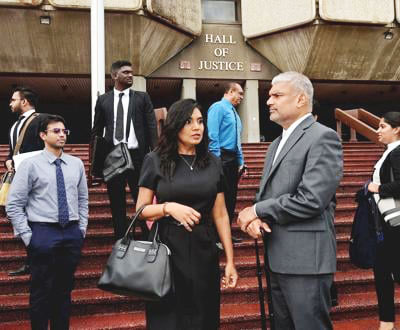(Trinidad Express) A three-judge panel at the Appeal Court has reserved its ruling in a legal challenge by Auditor General Jaiwantie Ramdass.
The appeal has to do with the decision of a High Court judge on June 3 to not grant her permission to file a claim for judicial review against the appointment of an investigative team to probe the $2.6 billion understatement in her report on the 2023 public financial accounts.
Reserving their ruling on Monday at the Hall of Justice in Port of Spain were Justices Mark Mohammed, Peter Rajkumar and James Aboud..
After hearing legal submissions from Ramdass’ lead attorney Anand Ramlogan, SC, and senior counsel Douglas Mendes, who is leading the case for the State, the justices said they required time to consider the arguments before arriving at their decision.
A date for the delivery of the ruling was not announced by the panel.
Until the decision is delivered, the investigative team, which was appointed by Finance Minister Colm Imbert and the Cabinet, will not be allowed to continue with the probe.
This was based on an undertaking given by another of the State’s attorneys, Simon de la Bastide, SC, as Justice Rajkumar heard Ramdass’ application for an expedited hearing of the procedural appeal on June 7. Ramdass is seeking to have the Appeal Court overturn the decision of Justice Westmin James who found that Imbert and the Cabinet had committed no wrong in having the investigative team appointed.
The team is being led by retired High Court justice David Harris.
Justice James had stated that the intended substantive claim was without merit and, therefore, he was not willing to grant leave to the Auditor General to pursue it.
Ultimately, Ramdass is seeking to have the court declare that the appointment of the investigative team was unlawful in that Imbert had usurped the constitutional role and function of the independent Public Service Commission (PSC) by appointing his own investigators to enquire into the conduct of public officers in the Ministry of Finance.
‘Avalanche of legal issues’
At the hearing of yesterday’s appeal, Ramlogan argued that Justice James was wrong in his reasoning.
He suggested that Imbert had a vested interest in the outcome of the investigation and had already arrived at his own conclusion based on statements he had made on record in Parliament that Ramdass had a role to play in the missing funds.
Given those statements, Ramlogan said it would be reasonable to conclude that the investigators would be biased against Ramdass.
He said Justice James had erred in finding that the investigation was permissible and that it did not amount to an unjustified and unlawful interference with the constitutional independence of the Office of the Auditor General.
“This is not an investigation by an independent body,” he said, adding: “There is no mandate given to the political arm of the State to oversee the conduct of the Auditor General.”
Ramlogan said the “bizarre factual matrix” of the case has left an “avalanche of legal issues cascading down on her (Ramdass’) head”, leading her into a financial struggle to pay attorneys to go up against the “legal army” that is representing Imbert and the Cabinet.
In response to his submissions, Mendes said the issue before the court was a simple one.
He submitted that the court only had two legal issues to consider.
The first was whether there was apparent bias against Ramdass based on the statements made by Imbert and, the other is, does the Constitution prevent the minister and the Cabinet from appointing the investigative team.
If the answer to any of those questions is yes, then Ramdass should be allowed permission by the Appeal Court itself to pursue her claim in the High Court.
On the other hand, if the answer to both questions is no, then the procedural appeal should be dismissed.
Mendes submitted that, in his view, sections 116 and 136 of the Constitution did in fact allow the appointment of the team by the minister and the Cabinet.
Also, there can be no perceived bias against Ramdass because of the utterances made by Imbert.
“If you disagree with the judge, you are entitled to say that and grant leave. If you agree with the judge, you are also entitled to say so,” said Mendes.
To bolster his argument on the bias point, Mendes said anybody or any institution that is launching an investigation against a person will have a point of view over the conduct of the person to be investigated.
This does not mean that the person being investigated had committed any wrong.
As a matter of fact, Mendes said the investigation may very well clear the person of any wrongdoing.
“This investigation is taking place on the backdrop that the Auditor General herself saying that someone ought to be disciplined,” said Mendes.
Further to that, the attorney said Imbert was simply carrying out his responsibilities as Minister of Finance “to find out what went wrong and to ensure that it does not happen again”.
Appearing along with Mendes and de la Bastide are attorneys Joanne Julien and Sashtri Indarsingh, while Kent Samlal, Ganesh Saroop, Jodie Blackstock, Natasha Bisram and Aasha Ramlal appear with Ramlogan on behalf of Ramdass.









